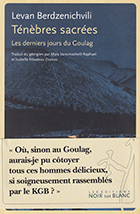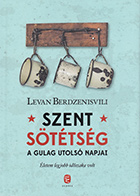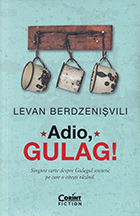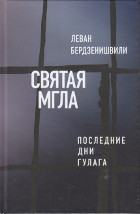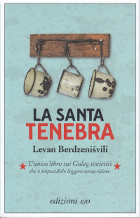Levan Berdzenishvili
Holy Gloom
Proposal
- Published by NLO, Russia
- Europa Editions, USA
- edizioni e/o, Italy
- Mitteldeutscher Verlag, Germany
- Europa, USA
- Corint, Romania
- Europa, Hungary
- Noir sur Blanc, France
- Green Books, India
- JP Službeni glasnik, Serbia
- Hohe Publisher, Ethiopia
„Holy Gloom“ is perhaps the only book about the Soviet camps which it is impossible to read without laughing. This is due to the talent of the narrator and his natural Georgian cheerfulness.
It is the most astonishing book ever written about the Gulag. Its author is equally astonishing – he seems to have lived not one, but rather ten lives. Levan Berdzenishvili is a member of the Georgian parliament and the founder of the Republican Institute of Georgia. He is also a Doctor of Philology, is well versed in ancient literature and translates it as well. Levan Berdzenishvili has been the general director of the Ilia Chavchavadze National Parliamentary Library of Georgia for many years, and is often invited to give public lectures, which are attended by thousands at universities in Europe and America and broadcasted on radio and television. He is also well known for being a Soviet dissident: He spent several years in a camp in Mordovia near the Volga (where Andrei Sinyavsky or Alexander Ginzburg also were incarcerated), and was one of the last political prisoners of the USSR who was convicted for anti-Soviet propaganda – in his case for founding the Republican Party of Georgia.
In his “Gulag Archipelago”, Solzhenitsyn wrote: “Starting precisely on the day when I consciously let myself sink to the bottom and felt it that ground solidly under my feet – that collective, hard and rocky ground – the most important years of my life began, the ones which gave me the definitive features of my character.” Levan Berdzenishvili takes this point a step further when he writes: “Those were the best years of my life. Never again was I among such people as the ones the KGB collected for me with such huge efforts.” It is in this spirit – with irony, humor and optimism, that the whole book is written. Levan’s portrait gallery, containing many famous scientists (mathematicians, linguists, geologists, biologists, historians et.al.) is depicted with artistic perfection. While reading this author’s book, we can easily forget that the heroes of his tale are people who really exist and indeed in their majority are still alive today.
The “anti-Soviet” geologist Zhora, we read, “alias Georgii Pavlovich Khomizuri, alias Non-Koba (Koba was Stalin’s party pseudonym), the perfect likeness of Johann Sebastian Bach as described by the poet Carl Sandburg, was a man of numbers. He could run up to you, full of excitement, and inform you that in one minute a million minutes will have passed since the birth of Christ. He could wake you up in the middle of the night and cheer you up by telling you that in forty seconds you would have a mere 44,444,444 seconds until your release. He took almost the entire camp hostage with his numbers, driving everyone crazy and terrorizing them with his six- and seven-digit figures.“
In his spare time, Rafik invented various useful household appliances. “He invented an automatic garlic press (this unit remained basically idle: where would we get the garlic?), an automatic nutcracker (this too remained a mere demonstrator – nuts were a rare “fruit” in the camp and only Georgians could get them). He also invented a machine for putting lines on printing paper, a machine for the removal of bones from fish which creates no waste and leaves the fish meat intact, and also a wooden mechanical meat grinder (I hadn’t seen meat in the camp for three years).
”While in prison, Genrikh read the entire Lenin… to be more exact: every single book that was to be found in the prison libraries. If it so happened that a multi-volume edition of Lenin was missing a volume, he created a scandal, forcing the authorities to complete the library’s collection. It is interesting to note that at one point he switched his reading from Lenin to Marx, causing his first doubts to emerge, and his faith to develop cracks. These cracks deepened and, after serving a term of the first sentence, he was released from prison having developed into a full-fledged anti-Soviet element.”
„The taxi driver Johnny (Zakharii), who knows Tbilisi residents better than anyone, recruited his taxi clients through patriotic conversations. In 1983, the Georgian party chief Eduard Shevardnadze felt it necessary to prove our loyalty and obedience to Russia, and launched a broad pro-Russian campaign across the country. Films were made in this spirit, plays were performed, poems were written, as well as short stories and novels. Pictures were drawn in pencil, painted in oil and pastel. In short, of a hundred possible signals of colonial submission to Moscow, a hundred and twenty were sent. At that time, the Soviet Union had entered into a deep economic crisis: the normal ration coupons for meat and butter were added exotic coupons for beans. Zakharii and the members of his organization commemorated of the anniversary of the organization’s founding treatise by covering the entire Tbilisi monument “Mother Georgia” in bean ration coupons. Levan Berdzenishvili gives us a glimpse not only behind the Iron Curtain, but also behind the curtain of this theatre of the absurd.
„Our imprisonment was characterized by a key feature: We were incarcerated not in the terrible thirties, not during the war, not at the height of the dissident movement, not in the era of stagnation under Brezhnev, but rather in the era of Soviet democracy, glasnost and perestroika. […] On one day official Soviet television spewed disinformation at us, and on the next day on the same screen Ronald Reagan was wishing us a Happy New Year. More experienced people said that sitting in the camps at that time was particularly unbearable. I can’t say, since I myself was not imprisoned at another time. I do trust people more experienced than I am on that score.” One of the author’s friends, who had already been incarcerated, was convicted for having distributed forbidden literature, but then the era of perestroika began and the „underground“ literature became available to a mass readership. Despite this, the man continued to serve his sentence in the Gulag. Timkin, another hero of the book „Holy Gloom”, spent 40 years in prison for having returned home from Nazi captivity instead of „fleeing“ abroad. Once at the camp they showed a documentary where Timkin recognized himself on the screen as he happily ran to greet liberating Soviet soldiers. “You idiot!” he screams at himself on the screen, “where you running, you fool?!? Stop! “ Alas, the Gorbachev amnesty for political prisoners was no more than a legend. We had to file a petition for clemency to get out of the camp.” The camp bathhouse attendant and assistant film camera mechanic was the Latvian nationalist and social democrat Dainis Lismanis. He had been arrested and sentenced to 12 years for betraying the „motherland“ (i.e. the Soviet Union). He was jailed for betraying a country in which he was not born, a country which he regarded as an invader and rapist. For this reason, after the occupation of Latvia, he became a member of the Social Democratic Party with its headquarters in West Germany.
Sometimes the verdicts of the courts were so absurd that they amazed even former camp inmates: for instance, one person was sentenced to five years for “undermining the authority of the Kolkhoz, i.e. the collective farm system”. His crime: although he owned new boots, he continued to wear the old ones.
This book is different from everything we have previously read about the Gulag. Of course, Levan Berdzenishvili’s heroes were plagued by hunger, placed in solitary confinement, deprived of the right of correspondence and meetings with relatives. Of course, there were snitches. But whereas those „socially close“ to the Soviet authorities used to be murderers and thieves, now the enviable position of the chef could only be occupied by someone convicted of war crimes, terrorism, espionage or treason. Among those considered to be „socially close” to Soviet power was, for example, the camp cook Akhper Radzhabov, who had sold the Americans the technical documentation of the pride of the Soviet military industry, SS-20 missiles, together with a Persian carpet.
Nevertheless, the author recalls his time in the camps with gratitude. It was a rarity, but Lavan’s heroes in the camp of the „democrats“, regardless of nationality, place of birth or political views, were united as one happy family by their love of literature, theatre, philosophy, history, and … football. These „walking encyclopedias” who fulfilled the plan of making 92 gloves for construction workers, argued about politics, about Marx and Karl Popper, about the possibility or impossibility of good communism, about how to construct a state, about ancient literature, about their best years and the most delicious good food. They organized scholarly talks in the form of Socratic dialogues between two inmates. On New Year’s Eve culinary and gastronomic groups (informal groups of prisoners who ran the gastronomic facilities, among them Jewish „Kibbutzim“, people from „Khristofed“ – Federation of Christian peoples of the South Caucasus -, as well as Lithuanian, Latvians, and Ukrainians) conducted an inventory of the food resources and created some semblance of their national dishes on the scarce rations they had at their disposal. With understanding, empathy and compassion, all friends of the author observed Johnny’s intense love for the prisoners’ class enemy in female form, the prison censor Ganichenko. One appearance of this cruel beauty in the camp caused “the radiation to increase to 100 roentgens”. They waged a long war with her for the opportunity to write letters to relatives in their native language. This struggle they won. Johnny, however, had to give up his unrequited love.
